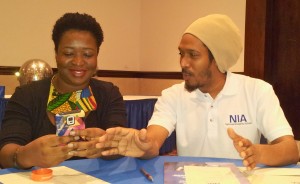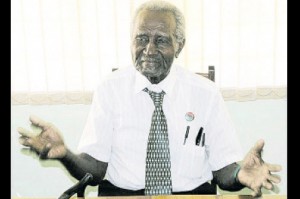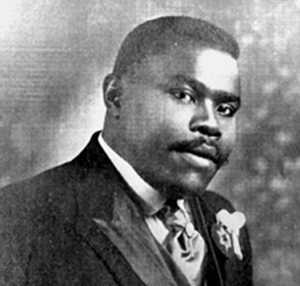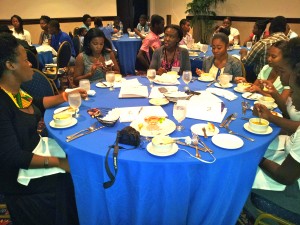
“Not a Poppy Show”: Activism and the Politics of Personal Conviction
October 15th, 2015
National Heroes Day is coming up. Perhaps it’s time to reflect on the inspiration that our heroes can infuse into our lives.
At a recent Induction Ceremony and training session organized by the anti-corruption group National Integrity Action (NIA), members had a special treat: a personal insight into a period of youth activism at the University of the West Indies (UWI), Mona campus from 2005 – 2008. Latoya West-Blackwood presented an overview of her experience as a volunteer member of the Marcus Garvey Movement on campus during those years. Ms. West-Blackwood is now a digital publishing consultant, but remains an activist and volunteers regularly, especially on youth programs. The young NIA members learned a great deal from her presentation. They were especially impressed by the group’s unity of purpose – a “solid foundation” on which to build and apply the practical elements of Garvey’s philosophy, in a way that would appeal to fellow students, without alienating them. This is the kind of movement that NIA members – mostly students – are seeking to build.

Latoya West-Blackwood and a former colleague in UWI’s Marcus Garvey Movement Allan Bernard share thoughts at the NIA training session in September. (My photo)
“We volunteered for everything,” said West-Blackwood. The Movement had presence on campus; members became well known for their integrity, reliability and their support for worthwhile causes. They did not get involved in trivial pursuits, but were always ready to lend a hand when needed. They were a recognizable force; they stood for something. “We were not a poppy show!” insisted West-Blackwood. Although the group was political, it was never involved in partisan politics, as UWI’s student leadership often is today, serving as a recruiting ground for young politicians. On the contrary, the Marcus Garvey Movement at UWI prided itself on its independence of political thought.

Garveyite and wise elder Frank Gordon was an important mentor for the student group. (Photo: Jean Lowrie-Chin)
The Movement believes in mentorship, and the group had its own excellent mentors at UWI Mona. These included Garvey scholar Rupert Lewis (now Professor Emeritus); the outstanding Garveyite and social activist Frank Gordon, who passed away in 2013; and Professors Brian Meeks and Verene Shepherd. Mentors play a vital role, helping groups such as these to find balance, West-Blackwood believes. They also instilled confidence and helped maintain the Movement’s sense of purpose.
The Marcus Garvey Movement at Mona also became a kind of moral compass. Like the NIA itself, members sought to hold fellow students, especially those in leadership positions, accountable for their actions and behavior. While advocating for students’ rights, it also reminded them of their responsibilities.
The Movement at that time had another trait that I consider very important for any activist group . It was well organized, consistent and systematic in the way it ordered its activities. It produced a weekly newsletter, Our African World, printing 500 copies each time and distributing them under the banyan tree in St. William Grant Park in downtown Kingston (West-Blackwood says her personal interest in publishing developed from this). It was clearly not one of those amorphous “on and off” groups, but formed a cohesive whole. It got things done.

Marcus Garvey founded the Universal Negro Improvement Association in 1914. The Movement’s activities on the Mona campus were firmly grounded in his philosophy of self-worth and action with integrity.
So where does the personal conviction come in? A crucial element of the Movement was that all its activities were grounded in Garvey’s philosophy of integrity, fearless leadership and nation-building – put into practice in Jamaican society. Each member believed in these principles. Moreover, the Movement had a broader regional and international outlook. It was involved in organizing two conferences on the continent of Africa – at the University of Free State in South Africa and at the University of Namibia. It entered into a partnership with UWI’s Centre for Caribbean Thought (“Linking Through Critical Thinking”) in the Department of Government, which continues its international outreach through exchange programs with Brown University and the University of Cape Town.

Latoya West-Blackwood (far left) engages in lunchtime discussion with NIA members during the training session. (My photo)
“This was not about us as students, as individuals,” West-Blackwood stressed. They were empowered by the international connections, but also by their grassroots work, both on and off campus. Many young people these days, she opined, are “bought out,” unable to think for themselves or to create for themselves a set of core beliefs and principles they can depend on. This state of mind eventually leads to apathy and a sense of powerlessness.
West-Blackwood left the NIA members to consider:“What is the impact of my actions? What is the purpose of my activism? Is it for my own benefit only – or is it aimed at nation-building?” If a young person’s actions come from the heart, from personal beliefs that are supported by mentors and shared with their peers, then they will find there is infinite power and motivation in moving forward.
This self-examination, it seems to me, is something we could do as we approach Heritage Week. Marcus Garvey says it best:
“The ends you serve that are selfish will take you no further than yourself but the ends you serve that are for all, in common, will take you into eternity.”
Tags: Brian Meeks, Caribbean, Frank Gordon, Kingston, Latoya West-Blackwood, Marcus Garvey, Marcus Garvey Movement, National Heroes, National Integrity Action, Rupert Lewis, University of the West Indies, Verene Shepherd, volunteerism
The Gleaner reserves the right not to publish comments that may be deemed libelous, derogatory or indecent.
To respond to The Gleaner please use the feedback form.
One Response to ““Not a Poppy Show”: Activism and the Politics of Personal Conviction”
- We Are the Zoomers
- Living Online with Humans and Birds: NAOC 2020
- Human Trafficking and the Problem of Public Education
- Down Memory Lane
- Are We Ready to Recover from COVID-19?
- Road Safety Matters: Is Your Vehicle Safe?
- Sexual Harassment, Me Too, and the Minister’s Disturbing Giggle
- The Vulnerable Senior Citizens, Private Care Homes and COVID-19
- A Muddle Over Masks
- Here is Something Life-Saving You Can Do: Give Blood!



Q1Marcus Garvey tried to persuade African Americans to leave the US if they watend to escape racial descrimination. He created a free land in which African Americans could travel in which they could live truly free lives. Marcus Garvey provided a boat that would take them to this island free of charge. The US government did not want to permit him from doing this, so they deported him away.